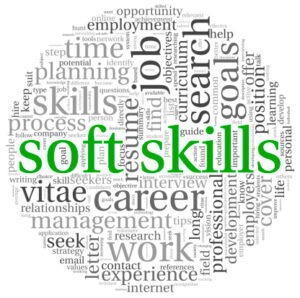The Most Desirable Soft Skills for Job Seekers in Nigeria is unique and necessitates some amount of experience and ingenuity to be completed successfully.
You must have the necessary knowledge and character to flourish in such a career. Numerous studies have demonstrated that keeping necessary skills is critical for an employee’s effectiveness.
There are two types of skills: hard (technical) and soft (non-technical). Hard talents are abilities that have a direct impact on the job.
The Most Desirable Soft Skills for Job Seekers in Nigeria are also known as job-specific skills because they are simple to learn and can be quantified and tested.
Software engineering, masonry, computer programming, automobile engineering, and other fields are examples.
Soft skills, on the other hand, are non-technical, personal characteristics related to how people work and connect with others.
They show your personality and character and play an important influence in your professional development and employment success. They are also difficult to learn because they are based on human emotions.
Formerly, employment recruitments were frequently based purely on who introduced the candidates, who they knew, or the hard skills they possessed.
Yet, companies have continued to recognize the importance of soft skills and have made them a prominent priority in choosing people to fill a post since the turn of the century.
Some even put them higher than candidates’ degrees of education and job experience because they are considered what distinguishes one candidate from another.
In this post, we’ll define soft skills, explain why they’re important, and discuss The Most Desirable Soft Skills for Job Seekers in Nigeria. So, keep reading to the end to find out more.
The Most Desirable Soft Skills for Job Seekers in Nigeria

What’s a Soft Skill and Why is It Important?
Soft skills are broadly characterized as a set of behaviours, personality traits, and social attitudes that help people to communicate effectively, collaborate effectively in the workplace, and successfully handle conflicts.
People with strong soft skills have strong situational awareness as well as emotional intelligence, allowing them to negotiate difficult work situations while achieving great results.
This is especially important for positions of leadership because excellent leadership entails managing a team and supervising their efforts toward a common goal.
Another benefit of soft skills in a Nigerian office is that they help with adapting to changing situations. Whether you’re in a leadership position or not, the ability to communicate effectively during difficult times or collaborate with others when solutions aren’t immediately apparent is essential.
The Most Desirable Soft Skills for Job Seekers in Nigeria – TOP 7
-
Communication Skills
To effectively communicate in the workplace, you need several components. These include your ability to communicate clearly and concisely through verbal communication, as well as positive body language and facial expressions through nonverbal communication.
You must also be able to produce reports, text messages, and other types of documents, which is known as written communication, as well as visual communication, which is the ability to transmit information using images and other visual aids.
Another key communication soft skill is active listening, which helps you to listen to and clearly understand what others are saying. To truly know how to effectively communicate with someone, you must first learn how to listen. Unless you have great listening abilities, any communication attempts will be one-sided and possibly useless.
2. Emotional Intelligence (EQ)
People become emotionally agitated fast as a result of current events and happenings at the local and international levels, which often affects how they interact with others. While this is perfectly normal and human, having the intelligence to deal with it in a way that does not harm your career or relationships with others is critical.
Being emotionally intelligent is being able to control and comprehend your own emotions as well as those of others. It entails being sensitive to other people’s situations, empathizing with their difficulties, and providing feedback in a way that does not hurt anyone’s feelings.
You will be able to develop strong working relationships and boost your self-esteem if you have high emotional intelligence. Learn this talent for free at www.jobberman.com/softskills.
3. Leadership Qualities
Businesses are looking for somebody who can direct and supervise others. They are looking for people who can build relationships at all levels of the firm. Leaders must evaluate, encourage, promote, and discipline people, as well as form teams, resolve conflicts, and build the organization’s chosen culture.
Understanding how to influence others and meet their needs is a vital component of leadership. Too many firms neglect the necessity of placing someone with the best technical skills in supervisory roles, failing to recognize that skill development is frequently a vital element of leadership training.
4. Teamwork
Most employees are assigned to a department/division/team, and even those who are not assigned to a formal team must cooperate with others.
You may prefer working alone, but it is vital to demonstrate that you value and understand the need of working together to achieve the company’s goals. This implies that you possess the soft skills necessary for productive teamwork.
5. Problem-Solving Capabilities
Many applicants try to minimize difficulties because they are ignorant that firms recruit people to address problems. Glitches, bumps in the road, and setbacks are all part of your work and provide learning opportunities.
The ability to apply your knowledge to address pressing problems and design practical solutions indicates your ability to manage and succeed on the job. Making errors and learning from them is an important aspect of developing a soft skills curriculum vitae.
6. Mindset for Development
In any career, regardless of role, you may encounter hurdles, disappointments, and other events that may upset you. A growth mindset is an important soft skill for persistence. Carol Dweck invented the term to define a mindset in which your abilities, talents, and intellectual ability are viewed as skills that can be cultivated and improved.
Someone with a growth mentality may see their failure to meet a quarterly goal as an opportunity to identify their strengths and weaknesses to meet the next quarter’s objective.
A person with a fixed mindset, on the other hand, may tell themselves that they aren’t excellent at creating analyses and let that negative perspective hinder their following quarter’s advancement as well because they don’t believe in their ability to change.
7. Personal Inspiration
Every job has its own set of problems and setbacks. But, the ability to recover and move on is critical. While employers and human resource managers are supposed to provide a work atmosphere that motivates employees, you must also be able to encourage yourself at all times.
As a job seeker, you must recognize the importance of always giving your best to work and developing abilities that will allow you to do so. You must learn to take initiative without being micromanaged.
Conclusion
Soft skills are essential for anyone who wants to succeed in the Nigerian workplace. To succeed, you need more than just academic credentials and hard skills; you also need soft skills like communication, leadership, teamwork, problem-solving abilities, and a growth attitude. Developing these abilities will enable you to perform as a good leader and adapt to the ever-changing work world.
It’s no secret that finding your desired career can be difficult, especially given the market’s restricted supply. Yet, keeping that employment is extremely difficult and involves far more than your technical abilities. Soft talents elevate you from an adequate candidate to an exceptional candidate.

